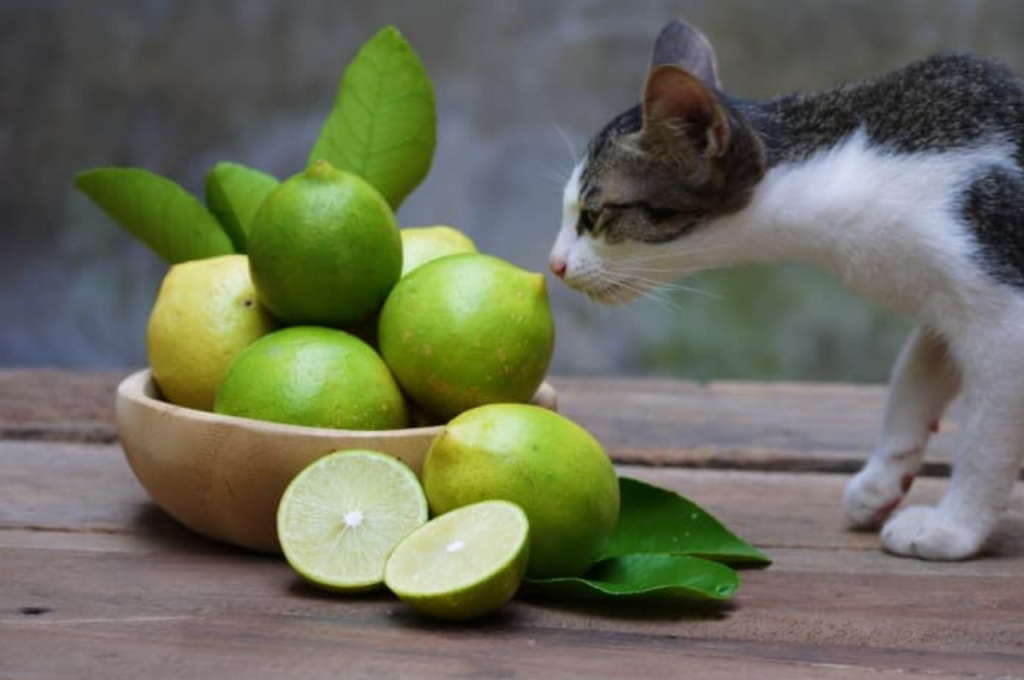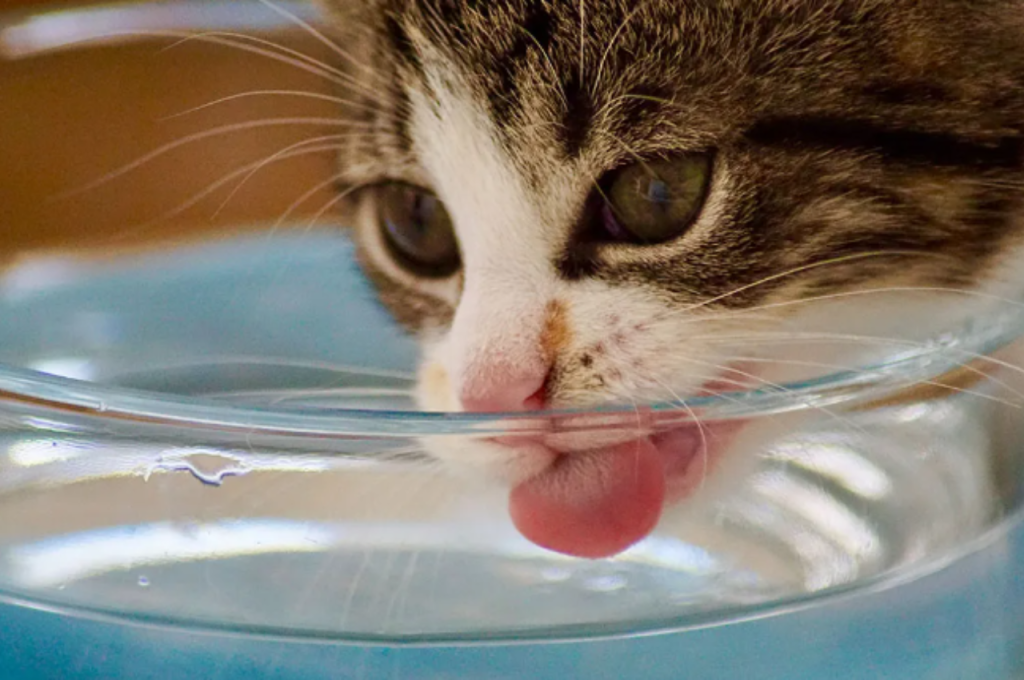Cats should not be given lemon as it can be toxic to them. Lemon contains psoralens and essential oils that are harmful to cats.
Lemon is a commonly used ingredient in many human recipes and household products because of its refreshing scent and tangy flavor. However, when it comes to our feline friends, caution is necessary as cats have different dietary needs than humans.
It is important to be aware of what foods are safe for cats and which ones can be harmful to their health. We will delve into whether or not cats can have lemon and explore the potential risks associated with feeding citrus fruits to your furry companions. By understanding the potential dangers of giving lemon to cats, you can help ensure the well-being and safety of your beloved pets.
The Relationship Between Cats and Citrus
Cats are notorious for their selective eating habits and discerning tastes. As cat owners, we’re often curious about what our feline friends find appealing or repellent, especially when it comes to unconventional items like citrus fruits. The relationship between cats and citrus is a topic of intrigue, encompassing both their behavioral responses and potential safety concerns. Let’s delve into this fascinating dynamic to gain a deeper understanding of how cats interact with citrus.

Cats’ Sensitivity to Citrus
Cats’ sensitivity to citrus is well-known in the feline world.
- Citrus fruits contain compounds that are harmful to cats.
- Exposure to citrus can cause stomach upset in felines.
History of Cats and Citrus
Historically, cats and citrus have had a complicated relationship.
- Ancient civilizations believed cats could ward off evil spirits associated with citrus trees.
- Cats were seen as protectors of precious citrus crops in certain regions.
Understanding Lemon and Its Components
Cats are curious creatures, and sometimes they might nibble on things that are not part of their usual diet. Cat owners need to be aware of what foods are safe for their feline friends. One common question that arises is whether cats can have lemon.
Lemon and Its Acidity
Lemons are highly acidic fruits, containing citric acid. Due to their strong acidity, lemons may cause stomach upset or irritation when ingested by cats. Their tartness can be unappealing to cats, making it unlikely for them to consume lemons willingly.
Toxicity of Lemon Components to Cats
- Essential oils in lemon skins can be toxic to cats.
- Limonene and linalool found in lemons are harmful to felines.
- Citrus oils can cause central nervous system depression in cats.
Effects of Lemon on Cats
Lemons are commonly used in human diets for their tangy flavor and various health benefits. However, when it comes to our feline companions, the effects of lemon consumption are a subject of concern and curiosity. While cats are known for their selective eating habits, it’s essential to delve deeper into the potential risks and considerations associated with offering lemons to cats.
Digestive System Impact
Lemon contains high levels of citric acid, which can disrupt a cat’s sensitive digestive system. This may lead to upset stomach, vomiting, or diarrhea in some cats.
Respiratory and Skin Reactions
A cat’s respiratory system and skin can also be affected by exposure to lemon.
- Contact with lemon oil or substances containing citric acid can cause skin irritation in cats.
- Inhalation of lemon scent may lead to respiratory issues for some felines.
Can Cats Benefit From Lemon?
Lemons are a versatile citrus fruit that offers numerous health benefits for humans. But what about our feline companions? Can cats benefit from lemon too? Let’s take a closer look.
Potential Health Benefits
Lemons are known to be high in vitamin C and antioxidants, which provide various health benefits. However, it is important to note that cats have different dietary requirements and sensitivities compared to humans. While a small amount of lemon juice might not be harmful to your cat, it is unlikely to provide any significant benefits.
Some people believe that lemon can help with certain conditions in cats, such as oral health issues or even fleas. However, there isn’t sufficient scientific evidence to support these claims. Lemon juice can potentially irritate your cat’s digestive system and cause upset stomach or diarrhea.
Safe Alternatives for Cat Health
If you’re looking for alternative ways to improve your cat’s health, there are several safe options available:

- Fresh Water: Make sure your cat has access to clean and fresh water at all times. Staying properly hydrated is essential for their overall well-being.
- High-Quality Cat Food: Feed your cat a balanced and nutritious diet that meets their specific dietary needs. Consult with your veterinarian to ensure you’re providing the right food for your furry friend.
- Regular Veterinary Check-ups: Schedule regular check-ups to monitor your cat’s health and catch any potential issues early on. Your veterinarian can provide personalized advice and recommend suitable treatments or supplements if necessary.
- Proper Grooming: Regularly brush your cat’s fur to prevent matting and remove any loose hair. This can help reduce the occurrence of hairballs and keep their coat in good condition.
Remember, when it comes to your cat’s health, it’s always best to consult with your veterinarian for professional advice. They can guide you on the most appropriate ways to support your cat’s well-being and provide the care they deserve.
Lemon and Feline Behavior
Have you ever wondered how cats respond to the scent of lemons? It turns out, citrus fruits like lemon can have an interesting impact on feline behavior. In this article, we will explore the connection between cats and lemons, focusing on their response to citrus and the potential effects on their behavioral patterns. Let’s dive in and uncover the curious world of cats and lemons!
Cats’ Response to Citrus
When it comes to lemons and other citrus fruits, cats have an interesting reaction. Many cats are known to be repelled by the scent of citrus, including lemons. The strong, tangy aroma of lemons can trigger a variety of responses in our feline friends.
- Cats may scrunch up their noses and wrinkle their faces in distaste when exposed to lemon scents.
- Some cats may even exhibit a strong aversion, immediately moving away or displaying signs of discomfort.
- This reaction can be attributed to a compound called limonene found in citrus fruits, which cats are particularly sensitive to.
It’s important to note that while many cats may show a negative response to lemons, not all cats are bothered by citrus scents. Just like humans, cats have unique preferences and sensitivities. Some cats may not be affected at all, while others may show a strong dislike for the scent of lemons.
Impact on Behavioral Patterns
The reaction of cats to lemons and citrus scents can have potential implications on their behavioral patterns. Here are some ways lemon’s presence may influence your feline friend:
| Lemon’s Presence | Impact on Behavior |
| Peeing outside the litter box | In some cases, the presence of lemons or lemon-scented cleaning products may deter cats from using their litter boxes properly. It is believed that the strong citrus scent can interfere with their natural desire to urinate in specific areas. |
| Scratching furniture | If your cat has a habit of scratching furniture, placing lemon-scented items around the targeted areas can help discourage this behavior. The scent is often seen as unpleasant to cats, making them less likely to mark their territory in those locations. |
| Curiosity and exploration | While lemons may repel cats, their inquisitive nature may still lead them to investigate and interact with the fruit. This curiosity can result in playful interactions or attempts to paw at the lemon. |
Remember, it is important to observe your cat’s reactions and behavior closely when introducing lemons or citrus scents into their environment. Just like any new object or scent, it may take some time for your cat to adjust or react.
Managing Citrus Exposure for Cats
Citrus fruits, such as lemons, are popular ingredients in many culinary dishes, but when it comes to cats, these fruits can pose potential health risks. As a responsible cat owner, it is crucial to understand the potential dangers of citrus exposure and take preventive measures to safeguard your feline companion.
Preventive Measures
When it comes to managing citrus exposure for cats, prevention is key. To keep your cat safe from potential lemon toxicity, consider the following preventive measures:
- Avoid allowing your cat to come into direct contact with lemons or other citrus fruits.
- Ensure that any household products containing citrus oils or extracts are stored safely out of your cat’s reach.
- Monitor your cat’s behavior and symptoms closely if you suspect they may have ingested or come into contact with citrus fruits.
Treatment for Lemon Toxicity in Cats
If you suspect that your cat has been exposed to lemons or is displaying symptoms of citrus toxicity, it is crucial to seek immediate veterinary care. Treatment for lemon toxicity in cats may include:
- Inducing vomiting to eliminate any remaining citrus substances from the cat’s system.
- Administration of activated charcoal to help absorb any toxins present in the cat’s digestive system.
- Supportive care to address symptoms such as vomiting, diarrhea, or lethargy.
Myths vs Facts on Cats and Citrus
The relationship between cats and citrus has long been a topic of curiosity and speculation among pet owners. From myths about cats’ aversion to citrus scents to misconceptions about the safety of offering citrus fruits, separating fact from fiction is essential for ensuring the well-being of our feline companions. Let’s debunk some common myths and explore the facts surrounding cats and citrus.

Common Misconceptions
Some cat owners believe that lemons are toxic to cats due to their acidic nature. Another misconception is that cats cannot consume citrus fruits at all.
Scientific Evidence and Findings
Studies show that cats may not react badly to lemons, but they generally dislike the smell. Lemon peel and seeds can be harmful if ingested by cats in large amounts.
Frequently Asked Questions On Can Cats Have Lemon?
Certainly! Here are some frequently asked questions (FAQs) about cats and citrus:
Can cats have a lemon?
Lemons are highly acidic and can cause digestive issues in cats. It is best to avoid giving them lemon as it may lead to vomiting and diarrhea. Stick to cat-friendly foods to keep your furry friend happy and healthy.
Why is lemon bad for cats?
The high acidity in lemons can disrupt the pH balance in a cat’s digestive system. This can lead to stomach upset, stomachache, and other gastrointestinal problems. It is important to avoid feeding lemons or any other acidic fruits to cats.
Are there any health benefits of giving lemons to cats?
No, there are no health benefits of giving lemons to cats. It can be harmful to their digestive system. Cats have specific dietary needs that differ from humans, and citrus fruits like lemons are not part of their natural diet.
What should I do if my cat ingests lemon?
If your cat accidentally ingests lemon, monitor them for any signs of discomfort or changes in behavior. It is recommended to contact your veterinarian for further advice. Keep an eye on their eating, drinking, and bathroom habits to ensure their health remains stable.
Conclusion
It’s best to avoid giving cats lemons, as they can be toxic to them. Opt for safer treats for your feline friend and consult a vet if you have any concerns about their diet. Keeping your cat’s health in mind is crucial for their overall well-being.
Remember, when it comes to their diet, always prioritize their safety.
